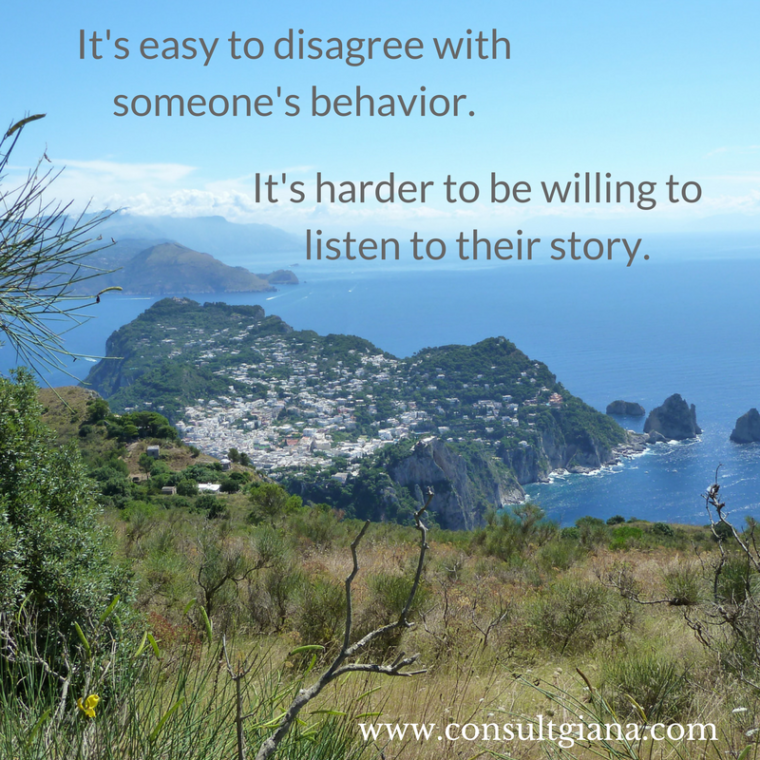
Viktor Frankl survived a concentration camp and said this…
Forces beyond your control can take away everything you possess except one thing, your freedom to choose how you will respond to the situation.
Post Charlottesville conflict continues to fill the airwaves and cyberspace, encouraging chaos and division.
…So how have you been responding? Are you:
- Denying that this conflict is impacting real lives, workplaces and communities?
- Pushing your perspective on others?
- Sitting in silence and worrying about it?
- Studying the issues, and then carrying your candle into the darkness, determined to be a part of the solution?
IF YOU SEEK TO BE A PART OF THE SOLUTION:
The process below will help you fully leverage your freedom, while strategically using both your mind and your heart.
Seek FIRST to UNDERSTAND:
- Your perception and my perception don’t have to be the same to be real to each one of us.
- You’re NOT listening to someone if you respond by saying, “It wasn’t me.” – Or – “Look – they are just as bad.”
CHOOSE COMPASSION:
Sit with those you don’t understand or agree with and listen. Use your ears and your heart, honoring the experiences that are driving their emotions.
- How old are they?
- Where have they lived and traveled?
- How have they personally experienced hate? – Or – How have they been taught to hate?
- How many years have they been experiencing hate? – Or – Been focused on hateful propaganda?
- How long does it take you to forgive intentional hate? – Or – Consider a new perspective?
Now let everything they shared soak in.
Did you hear anything you had not considered before? How has your knowledge, compassion and understanding increased?
THINK CRITICALLY: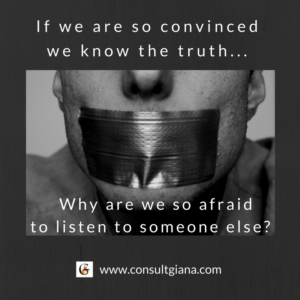
Deeply consider current events and historical facts.
- As you review current publications – Are you reading and considering all sides to a story? Are you mindful of specific examples throughout history – where evil people manipulated violence and death to spin the narrative and control the outcome? Do you identify false news – especially when it is saying what you want to believe or are you being manipulated?
- If you are struggling with hate speech – Have you ever considered why we have freedom of speech? How do you use your freedom of speech? Do you know what it is like to live where speaking what you believe is restricted? Have you studied what has happened in countries where this freedom has been taken away? Can you separate hateful speech from hateful acts?
- When preserving history is important to you – Will you review how history has been preserved in your community? Is the whole story being told about the imperfect humans from different races that shaped our country? …Or are there better ways to do this?
NOW CHOOSE YOUR RESPONSE:
Don’t be surprised if you learn something that softens your heart, or alters your thinking. Slightly or significantly. You are growing.
Your brain is wired to learn. So whatever you think stirs your emotions. Those emotions then direct your behavior and ultimately create your results.
THEN LOOK FOR LIGHT AND SHARE IT:
 Now focus on discovering and sharing how people are communicating, working together and finding solutions – by doing so, you are sharing vision, offering hope, and generating more light.
Now focus on discovering and sharing how people are communicating, working together and finding solutions – by doing so, you are sharing vision, offering hope, and generating more light.
One candle illuminates the darkness.
One person can make a difference.
Be that one.
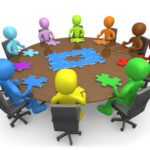 I have used this process with many divisive issues. Each time has led to a different result.
I have used this process with many divisive issues. Each time has led to a different result.
- Sometimes I started on an uninformed fence, and ended up with an informed opinion.
- Other times, I started in one place, and ended in another.
- And in other situations, my heart has softened greatly toward those that hold a different opinion, even though my mind still holds many of my original views.
If you decide to continue reading below, I will share where this issue has taken me.
My objective is NOT for you to agree with me. Instead I want to:
- Emphasize the importance of leveraging our uncommon freedom – to listen, think, speak, collaborate, learn and problem solve.
- Spotlight the wisdom that comes from strategically balancing the use of both your heart and your brain when these issues arise.
I’d love to hear from you as you work this process: Where did you start? What are you learning? How are you sharing those learning’s with others?
When New Orleans considered removing Confederate statues:
- I thought of the way the Nazis controlled what people learned – so that they could manipulate what people thought and how they would respond. As a result, my immediate reaction was that we can’t learn from erased and sanitized history – therefore it would be dangerous and unwise to remove statues.
MY HISTORICAL FILTERS:
I was raised in a state that is 90% white and although I was not surrounded by diversity, I was taught to love my neighbor as myself.
As a child I raged about slavery and racism – but viewed it all as historical. Almost as if someone had waved a magic wand and suddenly racism disappeared. (Not at all logical, but what my heart wanted to believe.)
SEEKING FIRST TO UNDERSTAND and CHOOSING COMPASSION:
As an adult I moved to a southern state, and new friends helped me understand that when they were children it was illegal for them to:
- Use a toilet or to drink from a fountain for white people
- Eat in particular restaurants and limited seating in other restaurants
- Attend school with white children
- Marry a white person
- Vote
LEARNING: My friends have scars from years of their lives – living what I have only imagined.
A few years later I moved to another southern state and discovered that one of my black friends was afraid to go to a neighboring city in the daylight because the KKK is still terrorizing people there. A few weeks later, a white friend shared that when he moved to the area from another state that he had invited black friends to his home and the KKK warned him not to do it again.
LEARNING: Some of my friends are still living – what I have only imagined.
Most recently, I spent 4 years living overseas. During that time I lived near and worked with people from more than 50 nations in our world. And deeply treasured our conversations, sharing food, traditions, and learning about each other.
Although most of my experiences were filled with great love and are deeply cherished, I consistently witnessed people from one nation bullying and manipulating people from multiple nations, races and religions. In each of those moments, I was faced with the choice to believe that every single person from that nation is evil, or to look for the good. I chose the latter. At first I was only able to count 5% of the people I knew from that nation as compassionate, caring and trustworthy. With focused effort that percentage increased to 25%.
LEARNING: If the majority the interactions I had with people of a particular race, nationality or uniform throughout my entire lifetime were negative – Could I still make the hard choice to continue to look for the ones that aren’t like that? Or would I be even a little bit tempted to make the easy assumption that all of them are bad?
THINKING CRITICALLY:
As I explored all sides of this issue I was greatly influenced by a speech given by Mitch Landrieu, the Mayor of New Orleans about why he was removing the statues. It is important to note that I didn’t expect Mitch’s speech to impact my thinking. I thought he would offer some lame excuse for removing the statues. But his logic resonated. This is some of what he said…
New Orleans is truly a city of many nations, a melting pot, a bubbling caldron of many cultures. There is no other place quite like it in the world that so eloquently exemplifies the uniquely American motto: e pluribus unum — out of many we are one. But there are also other truths about our city that we must confront. New Orleans was America’s largest slave market: a port where hundreds of thousands of souls were bought, sold and shipped up the Mississippi River to lives of forced labor of misery of rape, of torture. America was the place where nearly 4000 of our fellow citizens were lynched, 540 alone in Louisiana; where the courts enshrined ‘separate but equal’; where Freedom riders coming to New Orleans were beaten to a bloody pulp. So when people say to me that the monuments in question are history, well what I just described is real history as well, and it is the searing truth.
And it immediately begs the questions, why there are no slave ship monuments, no prominent markers on public land to remember the lynchings or the slave blocks; nothing to remember this long chapter of our lives; the pain, the sacrifice, the shame… all of it happening on the soil of New Orleans. So for those self-appointed defenders of history and the monuments, they are eerily silent on what amounts to this historical malfeasance, a lie by omission. There is a difference between remembrance of history and reverence of it.
For America and New Orleans, it has been a long, winding road, marked by great tragedy and great triumph. But we cannot be afraid of our truth. As President George W. Bush said at the dedication ceremony for the National Museum of African American History & Culture, “A great nation does not hide its history. It faces its flaws and corrects them.
…Consider these monuments from the perspective of an African American mother or father trying to explain to their fifth grade daughter who Robert E. Lee is and why he stands atop of our beautiful city. Can you do it? Can you look into that young girl’s eyes and convince her that Robert E. Lee is there to encourage her? Do you think she will feel inspired and hopeful by that story? Do these monuments help her see a future with limitless potential? Have you ever thought that if her potential is limited, yours and mine are too? We all know the answer to these very simple questions. When you look into this child’s eyes is the moment when the searing truth comes into focus for us.”
As I pondered his comments, I thought about Holocaust Museums that include the star that every Jew had to wear and Nazi uniforms, flags, and propaganda that helped Hitler promote his agenda. None of it is sanitized, but it is placed in context so we can all learn from it without honoring evil.
Further reading uncovered additional perspectives that have provided more food for thought:
- Thomas Tappan Thompson the designer of the Confederate flag wrote several editorials about his design, “As a people, we are fighting to maintain the Heaven-ordained supremacy of the white man over the inferior or colored race; a white flag would thus be emblematical of our cause.”
- General Robert E. Lee actively discouraged memorializing the confederacy, “I think it wiser,” the retired military leader wrote about a proposed Gettysburg memorial in 1869, “…not to keep open the sores of war but to follow the examples of those nations who endeavored to obliterate the marks of civil strife, to commit to oblivion the feelings engendered.”
- In Germany there are no statues to honor Nazi leaders and it is illegal to fly the Nazi flag unless it is for historical or film purposes.
CHOOSING MY RESPONSE:
People matter: Red, yellow, black or white. ALL are created by God and precious in His sight. ALL are my neighbors. And ALL make our world richer. Racism and hate don’t belong our multi-cultural country or in our world. So I will stand against it will every cell in my body.
The whole truth matters: There is a way to tell the story of strategic minds, and people who fought causes that they believed were honorable – while emphasizing that it is a failed caused, and that the oppression of others is evil. That story gets richer and more valuable when we are equally devoted to sharing the stories of those that were oppressed, those that fought for freedom, and how all cultures and races impacted our nation.
We can do better.
Image Credits: Fotolia, iStock

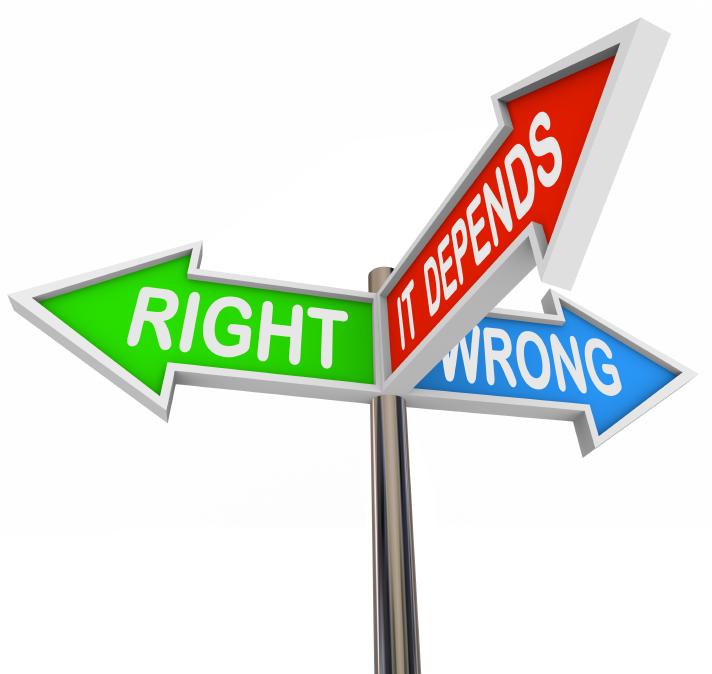
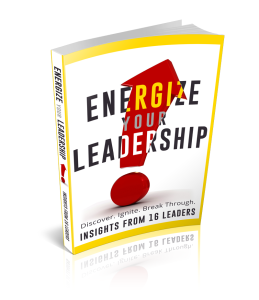
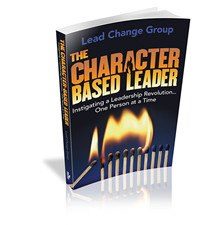
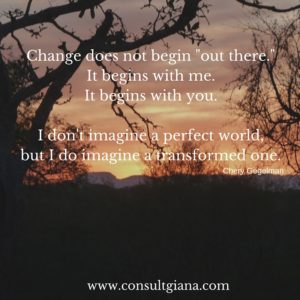
Brilliant post Chery! I agree that we all need to show compassion and truly listen to one another. It is a difficult time in this country right now but I believe in us and I believe we will emerge changed and different.
Love your strategies of listening and compassion and seeing the other points of view. I do this in all my leadership programs and eyes and hearts are opened.
Thanks Chery for your deep insights!
Thank you Terri! I love that all of your leadership programs include listening, compassion and other perspectives. People need those skills to be better leaders. Others will observe what their titled leaders are doing and began to do what they see. Workplaces, communities, nations and our world need more people intentionally using their hearts and their minds.
Well done Chery, you have grown so much from true life experiences. Keep doing what you do and opening the eyes of those that are closed to the real world. As I used to say to you i will not coat it with sugar, I will give you the truth. We have to take of the rose colored glasses and see people and the world for who they are. Action speaks louder than words.
Your friend for life
Arsenia Johnson AJ
Thank you AJ – I learned so much from you! Huge hugs to you!
So true…our actions really do speak louder than our words. I love your insights…and your heart, Chery. It really came out in this post… 🙂
Thank you LaRae
Your take on this echoes the thoughts in my head. It is as authentic to the world we live in and the solutions offered to the silent problems are as practical too. As an advocate for world peace, sometimes I get weary of extending and offering an olive branch but this has really refreshed me. It has also reminded me again that change first starts with me. To be better, to be more understanding because for some a learnt behaviour or attitude is not easy to unlearn. Remembering this makes it so much easier to tackle everyday hate spewed across the media and my day to day life. Thanks so much for being a light and a catalyst for world peace.
Barbara thank you so much for your comment. We need to encourage each other on this journey! I love your light and all that you teach me each time we talk! Never give up!